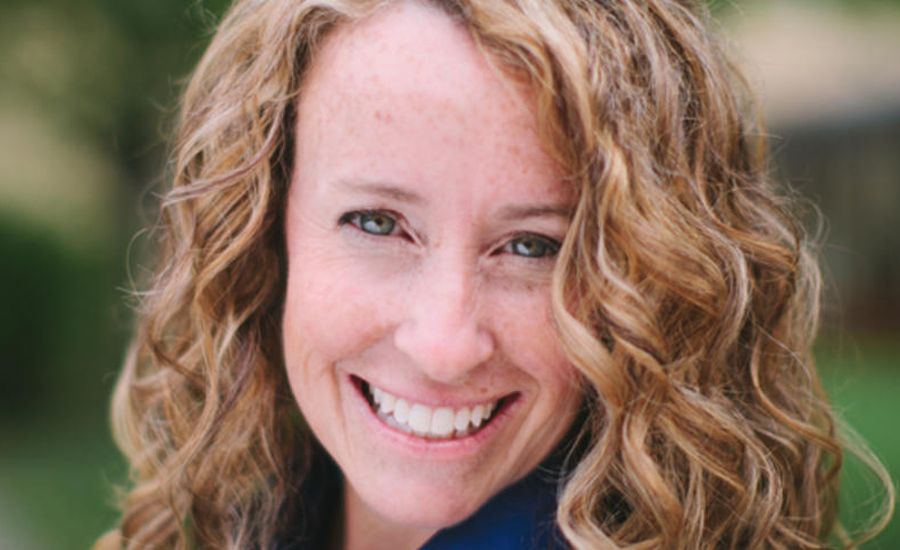Everyone has a breaking point. Concordia College professor of religion Jacqueline A. Bussie, PhD, reached that point when her mother was diagnosed with Alzheimer’s and forgot everything.
Suddenly, Christian platitudes that used to comfort her, like “It’s God’s plan,” felt empty and cruel. She needed space to grieve out loud, and not in the shadows. She needed to be angry with God, to question, to complain, to explore, to find and build an authentic, open and honest relationship with God and other people, without judgment.
Bussie wrote her new book, Outlaw Christian: Finding Authenticity by “Breaking the Rules,” to share her faith journey with others who are longing for a relationship with God free of shame and secrecy.
GUIDEPOSTS: Why is it important to have a faith that’s “outside the law”? What do you mean by that?
JACQUELINE A. BUSSIE: I try to clarify it’s not just any laws that I’m saying we need to break. A lot of the laws I’m really isolating are more cultural than they are Christian and that’s my point. I define an outlaw Christian as someone who is no longer willing to hide their grief, scars, questions, doubt, or anger from God or from each other. It’s on those particularly taboo topics that we need to break the law. I’m not saying let’s break all laws. The laws that I isolate they are really, really hurting us and they’re damaging our lives. They result in shame, secrecy and loneliness. And they’re not good for us.
GUIDEPOSTS: You summarize this point and your whole book well when you say: “In order to really follow Jesus, we must stop following laws that destroy life.”
JAB: That’s right. Even Jesus was a social revolutionary. Jesus was breaking certain laws. Jesus, He was helping people on the Sabbath. According to the law, that’s not permitted, but Jesus is questioning, is this law that we’re following life-giving? Is it spiritually fruitful for human beings? In that particular incident, the answer was, well, Sabbath rest is important but not if someone is in trouble. We need to be helping them. Jesus called us to question. I think Jesus was an outlaw and the Psalmist was an outlaw and Job is a perfect example of an outlaw.
GUIDEPOSTS: You quoted Job at the beginning of the second chapter, “I will not restrain my mouth; I will speak in the anguish of my spirit; I will complain in the bitterness of my soul.”
JAB: I love that quote, but have I ever heard a sermon on it? God comes in at the end [of the Book of Job] and says, ‘Job has spoken rightly of Me.’ It’s an amazing book, I think. Everything I ever learned from Sunday School about [Job] is not really what the text is saying. Job is saying, “I am completely impatient and I have a right to be.” And yet we say, “Oh, Job was so patient, the patience of Job.” It’s not who Job is; it’s not what the Bible says, it’s the spin we put on it.
GUIDEPOSTS: Why do we put that spin on it? Where did we get this idea that grief and sorrow and anger are shameful emotions we should hide from God and the world?
JAB: I think it comes from our culture and the sense that vulnerability is weakness. When we look at leaders, we want a traditional understanding of power. “I can make you think this way, I can make you act a certain way.” And I don’t think that what we get from Christianity is the same message at all. I think that they conflict. Our cultural values bleed over into our Christianity. Because in Christianity, what you have is a God who is completely vulnerable. The origin of the word “vulnerable” comes from the Latin word “wound.” We have a vulnerable God on the cross, a God who is willing to be wounded. That’s a very different sense of power than we have within our culture. God’s definition of power comes from the cross; it’s the only real power there is: that which empowers other people.
GUIDEPOSTS: Your vulnerability in expressing the limits of your knowledge of God, even as a PhD in theology makes Outlaw Christian all the more compelling. What’s the power in admitting you don’t know everything?
JAB: I think there’s so much power in not knowing everything because when we don’t know, we’re forced to ask someone else, forced to listen to other people and their experiences or forced to realize the deepest truths about the world. I think it’s the truth that Jesus taught: We’re interdependent upon each other. It’s painful to discover that. We would love to be independent. Did we grow the food we ate? Did we drill the oil we used to drive our cars today? Who were our teachers? The truth of the world is that really we should enter every day with a sense of radical gratitude, in my view. That’s what’s so important about this understanding of interdependence and I think uncertainty can teach us that.
GUIDEPOSTS: What does “radical gratitude” look like, in practice?
JAB: I think radical gratitude entails taking the time out of our busy lives and telling other people what it is that they’ve done for our souls. I think that it entails identifying who your “hope parents” are. I like taking time out to reflect upon who are the people who taught you how to have hope in the worst times, in the toughest times? And really reach out to them and thank them for that. I take that as a way of living into that passage in 1 Peter, “Be ready to give an accounting of the hope that’s with in you.” This being ready entails having these conversations and expressing our gratitude to the people who helped instill that hope in us.
This is going to sound paradoxical, but, like radical hope, I think radical gratitude, also entails acknowledging the real suffering of the world. As we talk about hope sometimes as Christians we omit some of the horror that’s given us the need to have hope. When we do that, we lose touch with the real situation that people are in. Real hope has to speak to real suffering. Radical gratitude has to do the same thing. When we bury our stories of scars and shame, we also bury stories of gratitude and hope. And that’s a problem.
GUIDEPOSTS: You say that honesty keeps you “always in trouble,” but also is the reason why you can “always find joy.” But honesty can also open you up to judgment and it can be very isolating to be honest with people who aren’t ready for or interested in honesty. So what’s the joy in honesty?
JAB: You’re totally right! Honesty will get you in trouble. I’m really struck by how true that is, particularly in our world today where there are many injustices, and when we speak truth to power about them, they’ll also be negative consequences for us. I guess I’m really relying on one of my favorite books, which is Alice Walker’s novel Possessing the Secret of Joy which I read in the midst of turmoil and truth telling in my own life. She says: the secret is resistance.
Honesty is always resistance. Honesty is resisting being told to hush up about something society doesn’t want us to talk about. Honesty is sharing our scars that we’re told are socially taboo, honesty is saying, everything is not perfect about my life even if it must look like it on Facebook.
Joy is not the same as happiness. Happiness depends on a circumstance, joy has this in spite of character. This idea that when we do resist injustice or suffering and we resist it in community, we do find joy in that, because we discover that we are not alone like we’re always told we were. As long as we’re hiding our grief from each other, everyone feels alone and ashamed. The minute you’re honest about that, the situation doesn’t change. I can’t take away the fact that somebody was abused or sexually assaulted but suddenly we have the joy of knowing I’m not alone if I’m fighting an injustice.
I’m not alone if I’ve been abused or I’m divorced or I have a mental illness. I have people who understand me. And that’s where I think the joy begins for Christians, because when we start thinking this way, who else has scars? Who else has a story of grief? Who else has been wounded? The answer to all of those questions is God. We learn that from Jesus. God has a story of grief. God too is wounded God. God understands what it’s like to be broken, and rejected and despised. And these are the things that happen to truth tellers within our culture.





